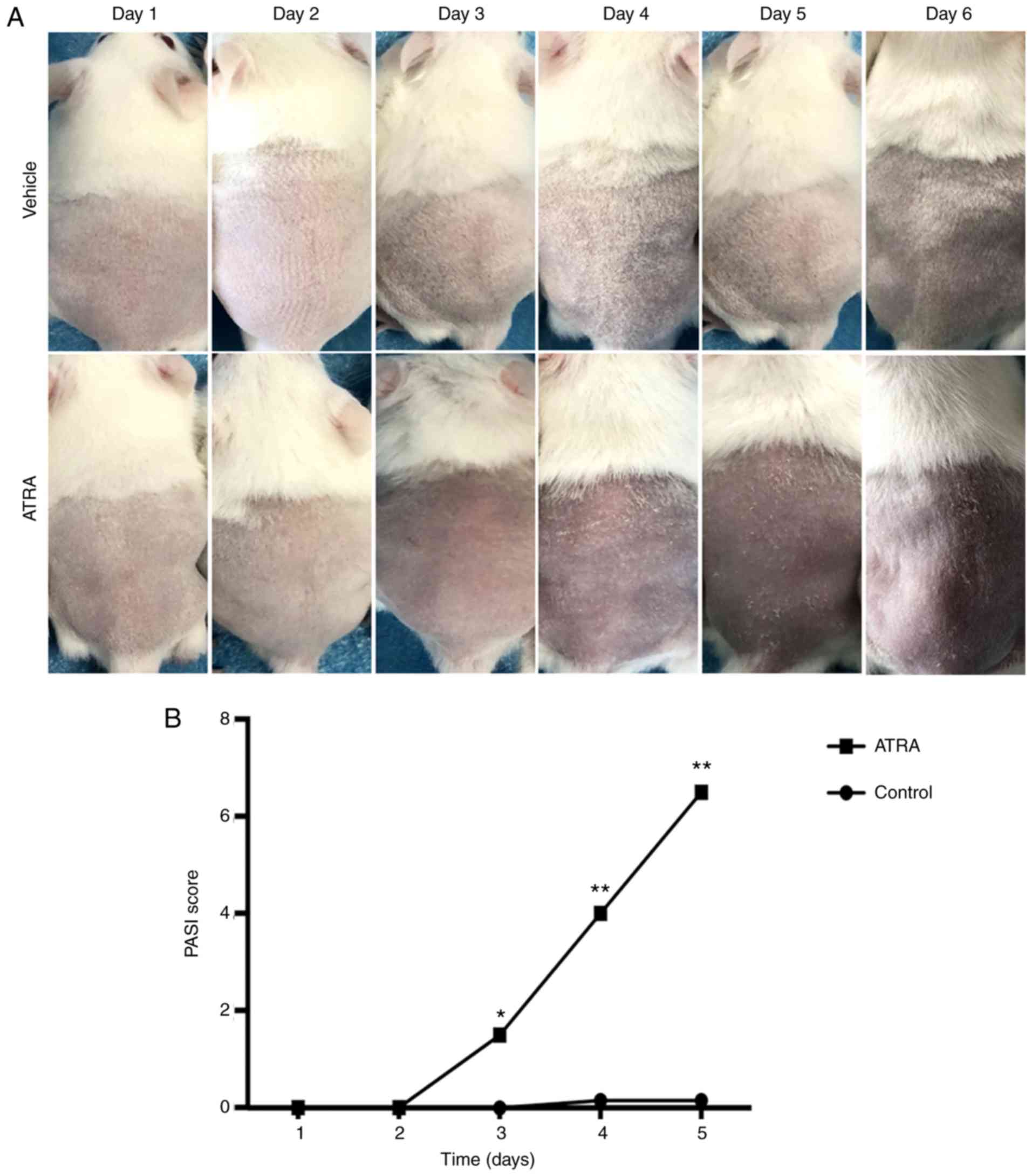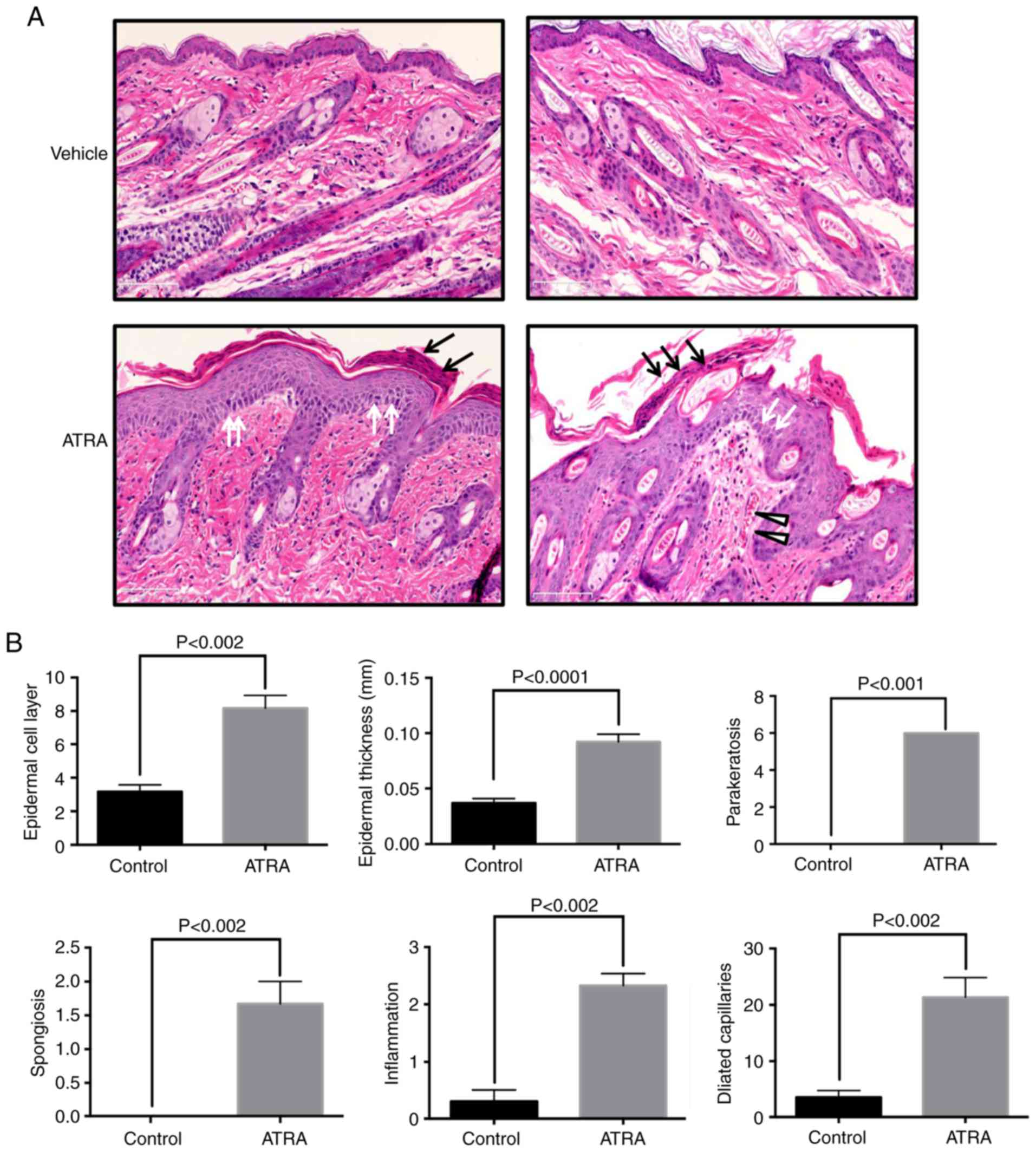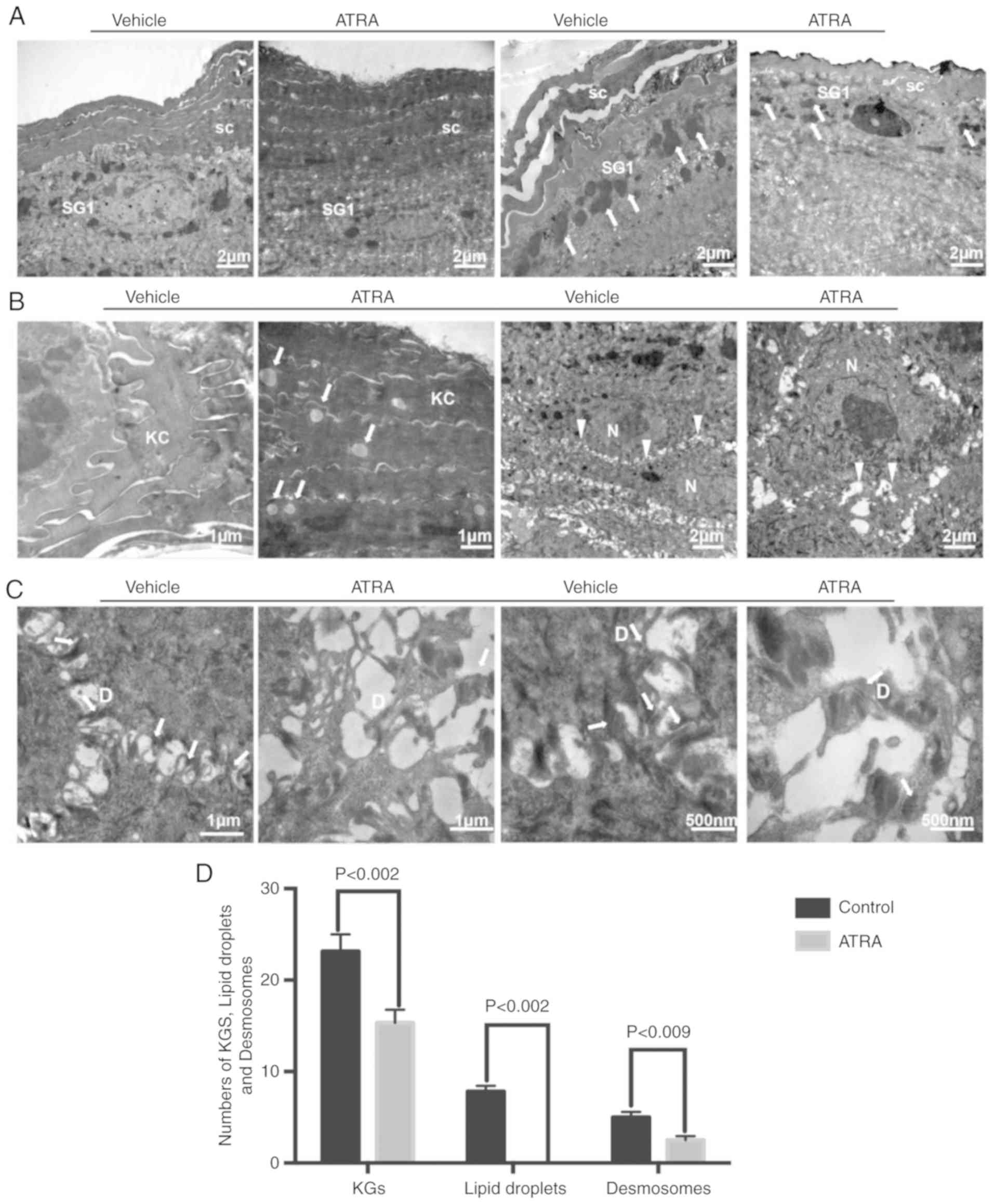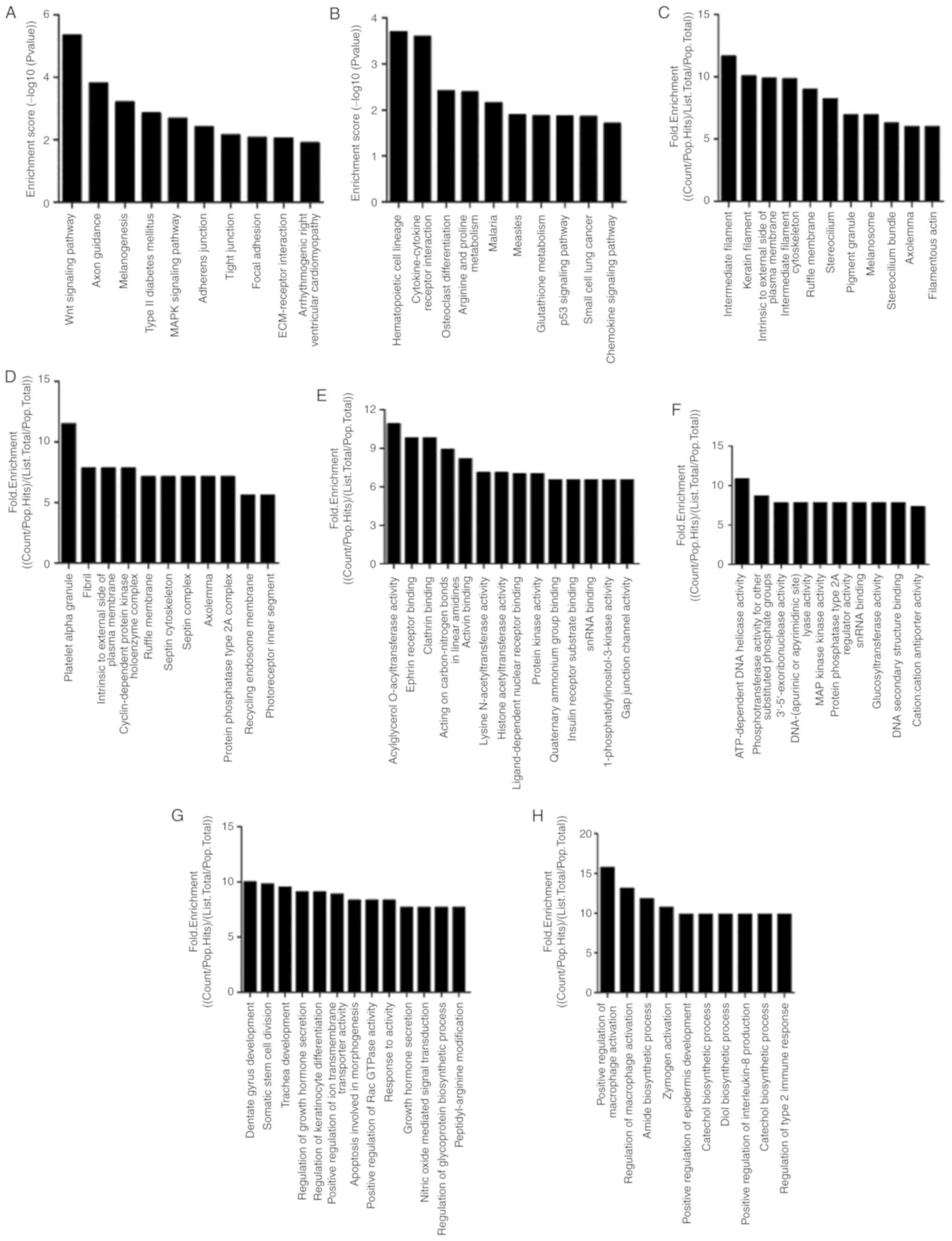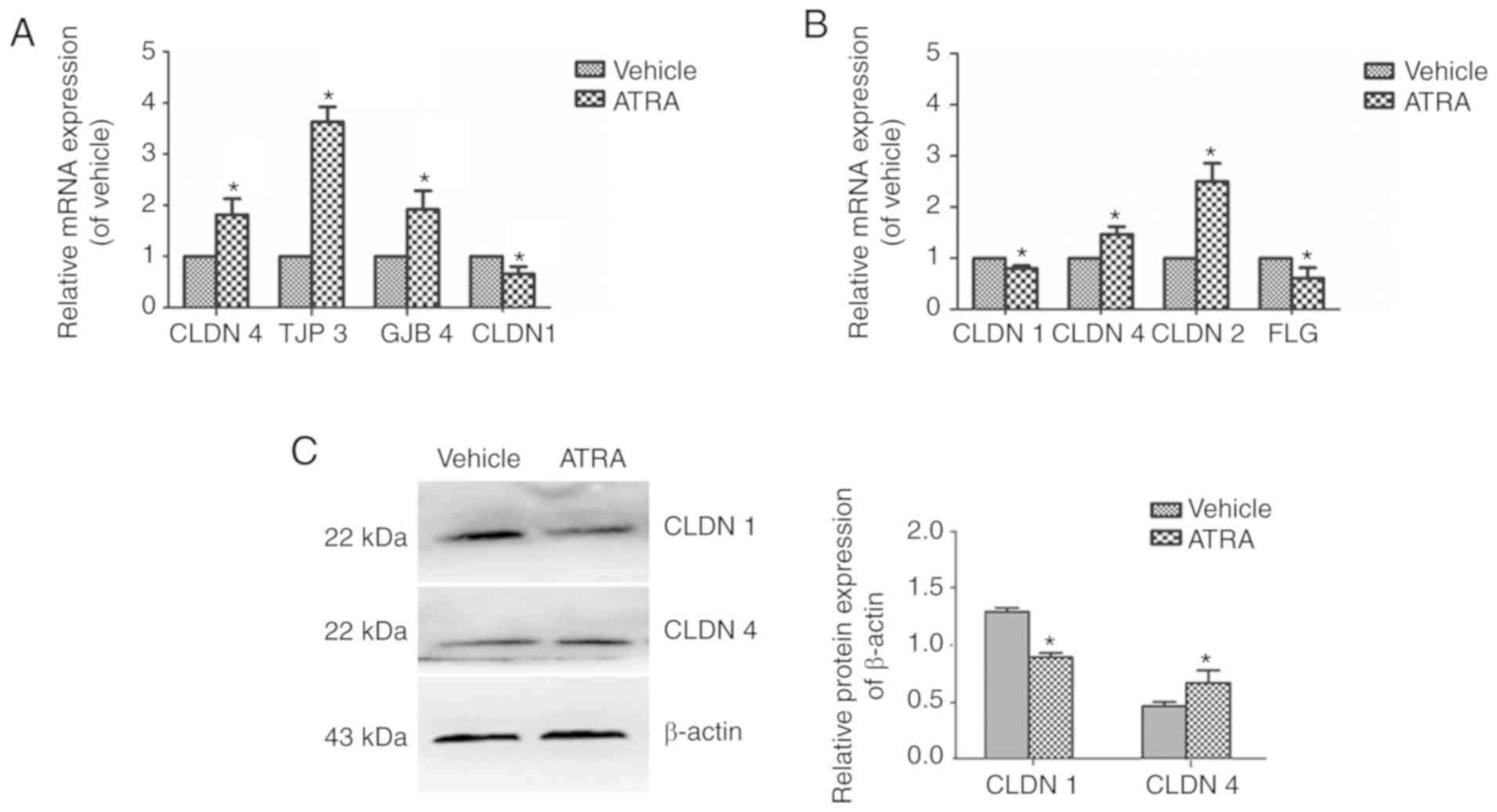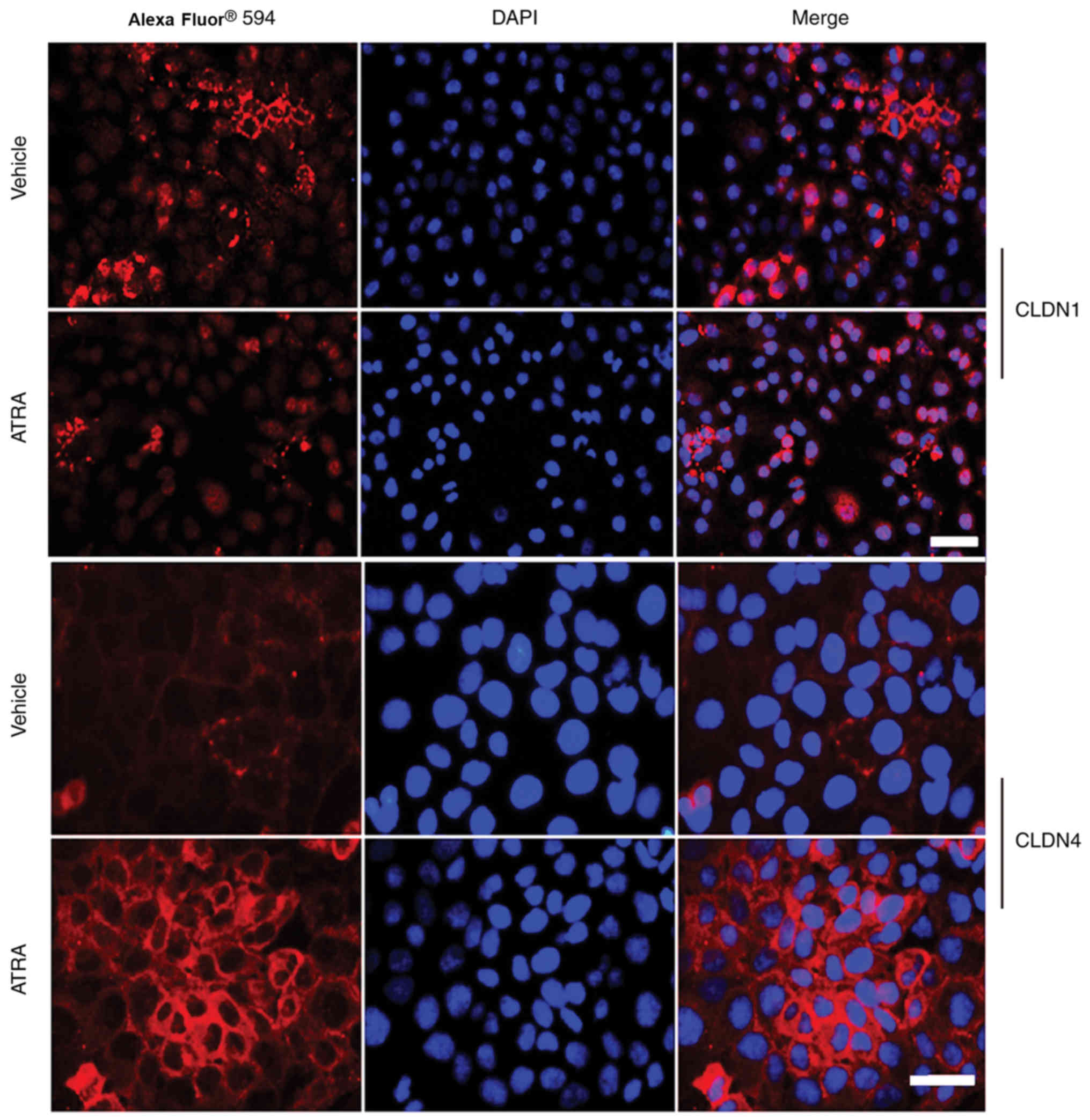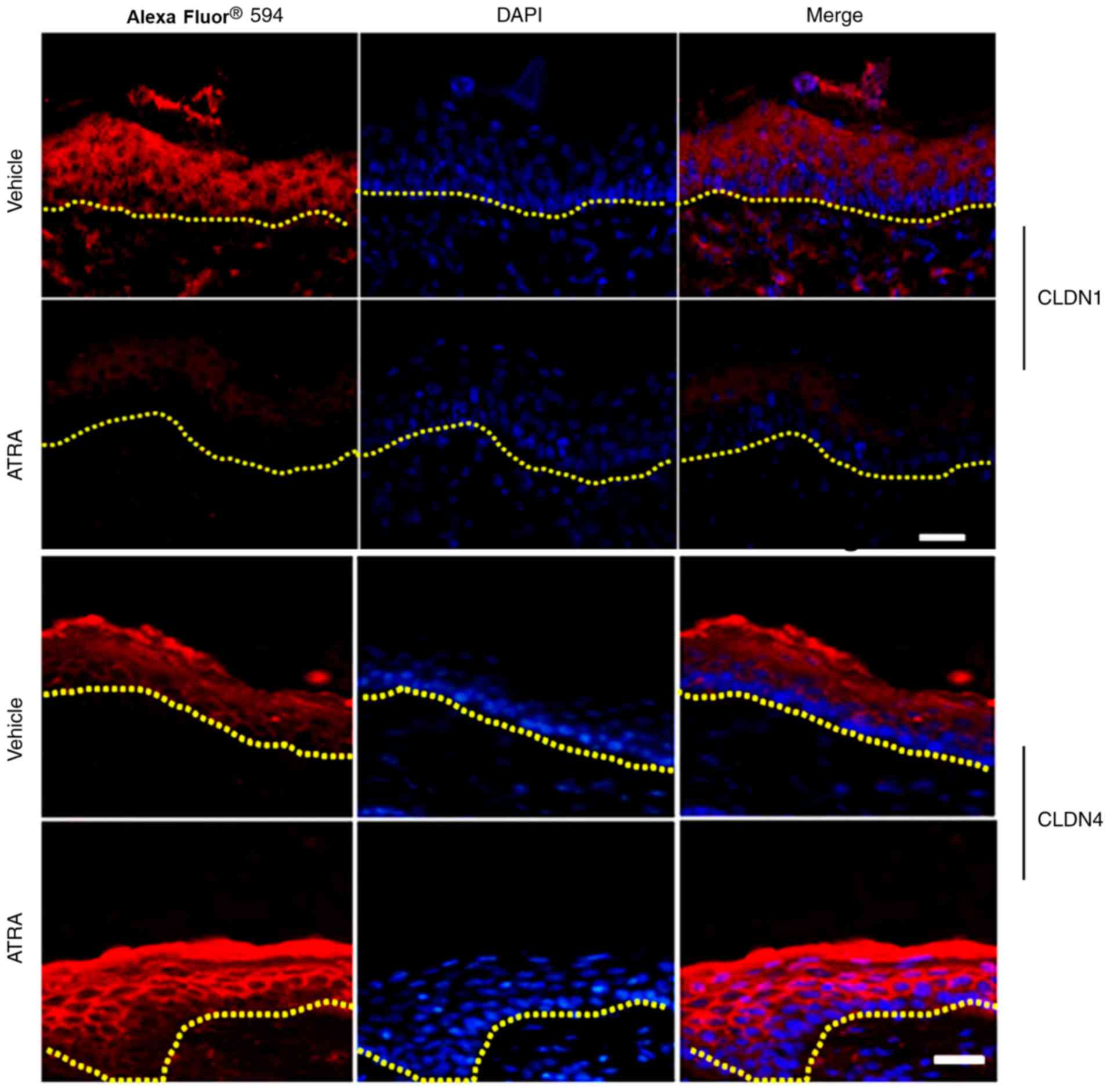|
1
|
Ahuja HS, Szanto A, Nagy L and Davies PJ:
The retinoid X receptor and its ligands: Versatile regulators of
metabolic function, cell differentiation and cell death. J Biol
Regul Homeost Agents. 17:29–45. 2003.PubMed/NCBI
|
|
2
|
Wilson L, Gale E and Maden M: The role of
retinoic acid in the morphogenesis of the neural tube. J Anat.
203:357–368. 2003. View Article : Google Scholar : PubMed/NCBI
|
|
3
|
Thielitz A and Gollnick H: Topical
retinoids in acne vulgaris: Update on efficacy and safety. Am J
Clin Dermatol. 9:369–381. 2008. View Article : Google Scholar : PubMed/NCBI
|
|
4
|
Torma H, Bergström A, Ghiasifarahani G and
Berne B: The effect of two endogenous retinoids on the mRNA
expression profile in human primary keratinocytes, focusing on
genes causing autosomal recessive congenital ichthyosis. Arch
Dermatol Res. 306:739–747. 2014. View Article : Google Scholar : PubMed/NCBI
|
|
5
|
Zhang ML, Tao Y, Zhou WQ, Ma PC, Cao YP,
He CD, Wei J and Li LJ: All-trans retinoic acid induces cell-cycle
arrest in human cutaneous squamous carcinoma cells by inhibiting
the mitogen-activated protein kinase-activated protein 1 pathway.
Clin Exp Dermatol. 39:354–360. 2014. View Article : Google Scholar : PubMed/NCBI
|
|
6
|
Ale SI, Laugier JP and Maibach HI:
Differential irritant skin responses to tandem application of
topical retinoic acid and sodium lauryl sulphate: Ii. Effect of
time between first and second exposure. Br J Dermatol. 137:226–233.
1997. View Article : Google Scholar : PubMed/NCBI
|
|
7
|
Kirschner N, Houdek P, Fromm M, Moll I and
Brandner JM: Tight junctions form a barrier in human epidermis. Eur
J Cell Biol. 89:839–842. 2010. View Article : Google Scholar : PubMed/NCBI
|
|
8
|
Brandner JM: Importance of tight junctions
in relation to skin barrier function. Curr Probl Dermatol.
49:27–37. 2016. View Article : Google Scholar : PubMed/NCBI
|
|
9
|
Furuse M, Sasaki H, Fujimoto K and Tsukita
S: A single gene product, claudin-1 or -2, reconstitutes tight
junction strands and recruits occludin in fibroblasts. J Cell Biol.
143:391–401. 1998. View Article : Google Scholar : PubMed/NCBI
|
|
10
|
Furuse M and Tsukita S: Claudins in
occluding junctions of humans and flies. Trends Cell Biol.
16:181–188. 2006. View Article : Google Scholar : PubMed/NCBI
|
|
11
|
Turksen K and Troy TC: Permeability
barrier dysfunction in transgenic mice overexpressing claudin 6.
Development. 129:1775–1784. 2002.PubMed/NCBI
|
|
12
|
Troy TC, Rahbar R, Arabzadeh A, Cheung RM
and Turksen K: Delayed epidermal permeability barrier formation and
hair follicle aberrations in inv-cldn6 mice. Mech Dev. 122:805–819.
2005. View Article : Google Scholar : PubMed/NCBI
|
|
13
|
Sugawara T, Iwamoto N, Akashi M, Kojima T,
Hisatsune J, Sugai M and Furuse M: Tight junction dysfunction in
the stratum granulosum leads to aberrant stratum corneum barrier
function in claudin-1-deficient mice. J Dermatol Sci. 70:12–18.
2013. View Article : Google Scholar : PubMed/NCBI
|
|
14
|
Hatakeyama S, Ishida K and Takeda Y:
Changes in cell characteristics due to retinoic acid; specifically,
a decrease in the expression of claudin-1 and increase in claudin-4
within tight junctions in stratified oral keratinocytes. J
Periodontal Res. 45:207–215. 2010. View Article : Google Scholar
|
|
15
|
Anderson JM and Van Itallie CM: Physiology
and function of the tight junction. Cold Spring Harb Perspect Biol.
1:a0025842009. View Article : Google Scholar :
|
|
16
|
Furuse M: Knockout animals and natural
mutations as experimental and diagnostic tool for studying tight
junction functions in vivo. Biochim Biophys Acta. 1788:813–819.
2009. View Article : Google Scholar
|
|
17
|
Furuse M, Hata M, Furuse K, Yoshida Y,
Haratake A, Sugitani Y, Noda T, Kubo A and Tsukita S: Claudin-based
tight junctions are crucial for the mammalian epidermal barrier: A
lesson from claudin-1-deficient mice. J Cell Biol. 156:1099–1111.
2002. View Article : Google Scholar : PubMed/NCBI
|
|
18
|
Gruber R, Börnchen C, Rose K, Daubmann A,
Volksdorf T, Wladykowski E, Vidal-Y-Sy S, Peters EM, Danso M,
Bouwstra JA, et al: Diverse regulation of claudin-1 and claudin-4
in atopic dermatitis. Am J Pathol. 185:2777–2789. 2015. View Article : Google Scholar : PubMed/NCBI
|
|
19
|
Tokumasu R, Yamaga K, Yamazaki Y, Murota
H, Suzuki K, Tamura A, Bando K, Furuta Y, Katayama I and Tsukita S:
Dose-dependent role of claudin-1 in vivo in orchestrating features
of atopic dermatitis. Proc Natl Acad Sci USA. 113:E4061–E4068.
2016. View Article : Google Scholar : PubMed/NCBI
|
|
20
|
Tokumasu R, Tamura A and Tsukita S: Time-
and dose-dependent claudin contribution to biological functions:
Lessons from claudin-1 in skin. Tissue Barriers. 5:e13361942017.
View Article : Google Scholar : PubMed/NCBI
|
|
21
|
Bożek A and Reich A: The reliability of
three psoriasis assessment tools: Psoriasis area and severity
index, body surface area and physician global assessment. Adv Clin
Exp Med. 26:851–856. 2017. View Article : Google Scholar
|
|
22
|
Fisher G, Esmann J, Griffiths CE, Talwar
HS, Duell EA, Hammerberg C, Elder JT, Finkel LJ, Karabin GD,
Nickoloff BJ, et al: Cellular, immunologic and biochemical
characterization of topical retinoic acid-treated human skin. J
Invest Dermatol. 96:699–707. 1991. View Article : Google Scholar : PubMed/NCBI
|
|
23
|
Livak KJ and Schmittgen TD: Analysis of
relative gene expression data using real-time quantitative PCR and
the 2(−Delta Delta C(T)) method. Methods. 25:402–408. 2001.
View Article : Google Scholar
|
|
24
|
Ovaere P, Lippens S, Vandenabeele P and
Declercq W: The emerging roles of serine protease cascades in the
epidermis. Trends Biochem Sci. 34:453–463. 2009. View Article : Google Scholar : PubMed/NCBI
|
|
25
|
Phillips TJ: An update on the safety and
efficacy of topical retinoids. Cutis. 75:14–22. 24discussion 22–23.
2005.PubMed/NCBI
|
|
26
|
Weiss JS, Shavin JS, Nighland M and
Grossman R: Tretinoin microsphere gel 0.1% for photodamaged facial
skin: A placebo-controlled trial. Cutis. 78:426–432. 2006.
|
|
27
|
Marshall D, Hardman MJ, Nield KM and Byrne
C: Differentially expressed late constituents of the epidermal
cornified envelope. Proc Natl Acad Sci USA. 98:13031–13036. 2001.
View Article : Google Scholar : PubMed/NCBI
|
|
28
|
Meyer-Hoffert U: Reddish, scaly, and
itchy: How proteases and their inhibitors contribute to
inflammatory skin diseases. Arch Immunol Ther Exp (Warsz).
57:345–354. 2009. View Article : Google Scholar
|
|
29
|
Sandilands A, Sutherland C, Irvine AD and
McLean WH: Filaggrin in the frontline: Role in skin barrier
function and disease. J Cell Sci. 122:1285–1294. 2009. View Article : Google Scholar : PubMed/NCBI
|
|
30
|
Epp N, Fürstenberger G, Muller K, de
Juanes S, Leitges M, Hausser I, Thieme F, Liebisch G, Schmitz G and
Krieg P: 12r-lipoxygenase deficiency disrupts epidermal barrier
function. J Cell Biol. 177:173–182. 2007. View Article : Google Scholar : PubMed/NCBI
|
|
31
|
Sybert VP, Dale BA and Holbrook KA:
Ichthyosis vulgaris: Identification of a defect in synthesis of
filaggrin correlated with an absence of keratohyaline granules. J
Invest Dermatol. 84:191–194. 1985. View Article : Google Scholar : PubMed/NCBI
|
|
32
|
Ponec M, Boelsma E, Weerheim A, Mulder A,
Bouwstra J and Mommaas M: Lipid and ultrastructural
characterization of reconstructed skin models. Int J Pharm.
203:211–225. 2000. View Article : Google Scholar : PubMed/NCBI
|
|
33
|
Amen N, Mathow D, Rabionet M, Sandhoff R,
Langbein L, Gretz N, Jäckel C, Grone HJ and Jennemann R:
Differentiation of epidermal keratinocytes is dependent on
glucosylceramide: Ceramide processing. Hum Mol Genet. 22:4164–4179.
2013. View Article : Google Scholar : PubMed/NCBI
|
|
34
|
Mao-Qiang M, Jain M, Feingold KR and Elias
PM: Secretory phospholipase A2 activity is required for
permeability barrier homeostasis. J Invest Dermatol. 106:57–63.
1996. View Article : Google Scholar : PubMed/NCBI
|
|
35
|
Lu B, Jiang YJ, Man MQ, Brown B, Elias PM
and Feingold KR: Expression and regulation of 1-acyl-sn-glycerol-
3-phosphate acyltransferases in the epidermis. J Lipid Res.
46:2448–2457. 2005. View Article : Google Scholar : PubMed/NCBI
|
|
36
|
Krieg P and Fürstenberger G: The role of
lipoxygenases in epidermis. Biochim Biophys Acta. 1841.390–400.
2014.
|
|
37
|
Feingold KR: Thematic review series: Skin
lipids. The role of epidermal lipids in cutaneous permeability
barrier homeostasis. J Lipid Res. 48:2531–2546. 2007. View Article : Google Scholar : PubMed/NCBI
|
|
38
|
Yuki T, Haratake A, Koishikawa H, Morita
K, Miyachi Y and Inoue S: Tight junction proteins in keratinocytes:
Localization and contribution to barrier function. Exp Dermatol.
16:324–330. 2007. View Article : Google Scholar : PubMed/NCBI
|
|
39
|
Yamamoto T, Saeki Y, Kurasawa M, Kuroda S,
Arase S and Sasaki H: Effect of RNA interference of tight
junction-related molecules on intercellular barrier function in
cultured human keratinocytes. Arch Dermatol Res. 300:517–524. 2008.
View Article : Google Scholar : PubMed/NCBI
|
|
40
|
De Benedetto A, Rafaels NM, McGirt LY,
Ivanov AI, Georas SN, Cheadle C, Berger AE, Zhang K, Vidyasagar S,
Yoshida T, et al: Tight junction defects in patients with atopic
dermatitis. J Allergy Clin Immunol. 127:773–786. e1–7. 2011.
View Article : Google Scholar
|
|
41
|
Kirschner N, Rosenthal R, Furuse M, Moll
I, Fromm M and Brandner JM: Contribution of tight junction proteins
to ion, macromolecule, and water barrier in keratinocytes. J Invest
Dermatol. 133:1161–1169. 2013. View Article : Google Scholar : PubMed/NCBI
|
|
42
|
Kubo T, Sugimoto K, Kojima T, Sawada N,
Sato N and Ichimiya S: Tight junction protein claudin-4 is
modulated via Δnp63 in human keratinocytes. Biochem Biophys Res
Commun. 455:205–211. 2014. View Article : Google Scholar : PubMed/NCBI
|
|
43
|
Telgenhoff D, Ramsay S, Hilz S,
Slusarewicz P and Shroot B: Claudin 2 mRNA and protein are present
in human keratinocytes and may be regulated by all-trans-retinoic
acid. Skin Pharmacol Physiol. 21:211–217. 2008. View Article : Google Scholar : PubMed/NCBI
|
|
44
|
Muto S, Hata M, Taniguchi J, Tsuruoka S,
Moriwaki K, Saitou M, Furuse K, Sasaki H, Fujimura A, Imai M, et
al: Claudin-2-deficient mice are defective in the leaky and
cation-selective paracellular permeability properties of renal
proximal tubules. Proc Natl Acad Sci USA. 107:8011–8016. 2010.
View Article : Google Scholar : PubMed/NCBI
|















